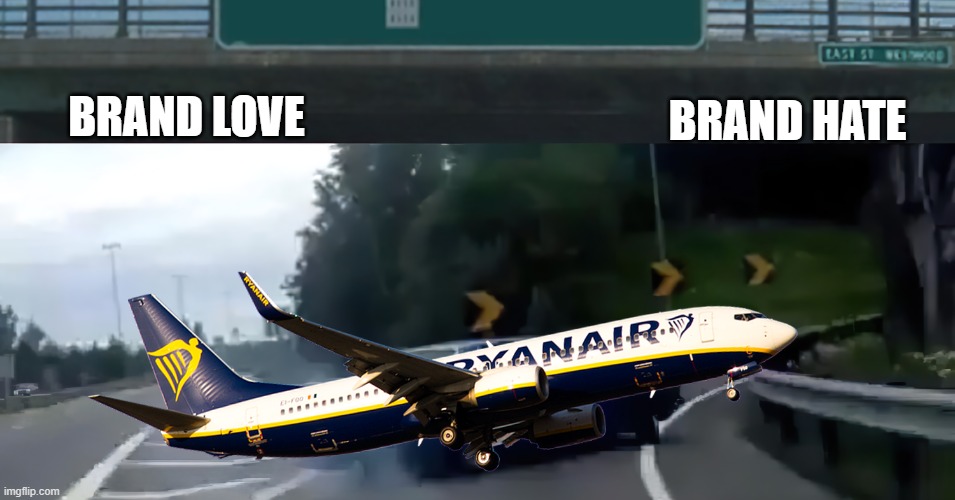In today’s competitive market, where companies battle for people’s attention, some brands have found an unconventional strategy to outshine others: self-deprecation. Rather than projecting an image of invincibility, these companies openly acknowledge their flaws and quirks, endearing themselves to customers in the process. And a prime example of a brand that doesn’t shy away from poking fun at itself is Ryanair, a prominent low-cost airline.
Known for its no-frills approach and candid CEO, Michael O’Leary, Ryanair has used self-deprecating humor to connect with passengers and build a distinct brand identity. No company does social media quite like Ryanair – and it’s refreshing to see. While most company accounts often stick to the status quo with generic updates and mundane information, the company has taken an atypical approach and lapped up millions of TikTok views and viral tweets in the process.

The airline has no problem holding its own. And while we often wonder how they get their tongue-in-cheek X (formerly Twitter) presence and creative TikTok + reel ideas signed off by management, we’re here for it. This approach is not without its risks, but when executed skillfully, it can lead to increased customer loyalty and a more engaged audience.
Also Read: “Thank You For Coming” Team Has A Strong Promotion Game
The Savagery
The budget airline is incredibly self-aware too and uses it to their advantage. For instance, one follower savagely blasted the company for letting “20-something woke imbeciles” run their social media accounts. What did Ryanair do? They simply and snarkily responded: “admins new bio.” When one user asked whether their planes had USB charging outlets, they hilariously told them, “yeah, they’re just under the seat massage function.”
In this article, we’ll explore how Ryanair used self-deprecating humour to build its marketing strategy.
Here, the airline highlights the 4 icks about themselves like – having to walk outside to get to the plane, no phone holders on the seats, paying for food, and smelly feet. The fifth ick is having no other flight alternative that is as cheap as Ryanair and being forced to put up with their poor services.
This showcases the heights of their savagery. When a customer complained about the “window seat” they wanted vs. the one they got, the company responded sarcastically saying they should increase their fares.
You're right, we should charge more… https://t.co/fZTOFM6JYL
— Ryanair (@Ryanair) October 2, 2023
The airline prides on the fact that no matter how much people complain about them, they will still come crawling back and fly with Ryanair since it’s the cheapest.
Ryanair definitely seems to be done with the passengers’ complaints about windows as seen in this post on their X.
Windows https://t.co/Fz0fLsgls2
— Ryanair (@Ryanair) October 4, 2023
Ryanair really doesn’t fear anyone. The airline teased the audience with a discount scheme through this post. Watch it to know how.
It seems like their social media manager woke up and chose violence every day. Guess this is where they got their inspiration from.
New marketing campaign just dropped: https://t.co/WRAr1g6QqD
— Ryanair (@Ryanair) September 1, 2023
This sarcastic take on “a day in the life of a junior working at Ryanair” is hilarious. It begins with him having to pay a fine for his oversized bag, getting to his assigned window seat but being told it’s someone else’s – referring to it as double booking of seats, snack guy selling food, and more funny gimmicks. Even their caption game is top-notch.
Now that we’ve seen why brands like Ryanair choose this path and the benefits it brings, let’s learn how other companies can learn from this unique approach.
The Power of Authenticity
Consumers today appreciate transparency and honesty from the brands they interact with. When a company like Ryanair openly acknowledges its shortcomings, it creates a sense of trust. Customers feel that the brand isn’t trying to deceive them or hide behind its imperfections.
Relatability and Humanization
By admitting their flaws, brands become more relatable and human. People inherently make mistakes, and when a company acknowledges its own, it humanizes the brand. This creates a stronger emotional connection with consumers who can forgive the brand’s average performance.
Breaking the Stereotypes
Ryanair’s approach also challenges the stereotypical image of corporate stoicism. It stands out in an industry often associated with rigid policies and hidden fees. By playfully mocking itself, Ryanair undermines these stereotypes and positions itself as a more approachable, customer-centric option.
The Fine Line Between Humour and Offense
While self-deprecation can be a powerful tool, it’s important for brands to tread carefully. There’s a fine line between being self-aware and inadvertently offending or alienating customers. Striking the right balance requires a deep understanding of the brand’s audience and a careful crafting of the brand message.
Lessons for Other Brands
While not every brand should emulate Ryanair’s exact approach, there are valuable lessons to be learned. Acknowledging imperfections, demonstrating transparency, and injecting humor can all contribute to a more authentic and relatable brand image.
Also Read: Indian Air Force Day Special: In An Exclusive Interview With Captain Shruti Chauhan
Self-deprecating humor has proven to be a bold and effective marketing strategy that challenges conventional norms and connects with consumers on a personal level. Brands like Ryanair demonstrate that embracing one’s quirks and imperfections can lead to stronger customer relationships and a more enduring brand identity. As other companies look to differentiate themselves in a crowded market, this unconventional approach might just be the key to standing out.


